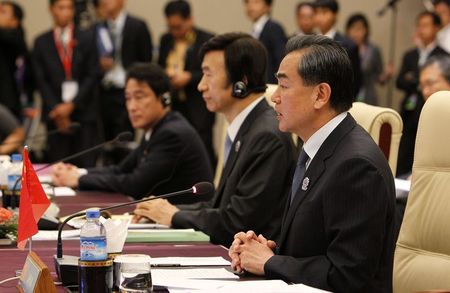By Paul Mooney and Lesley Wroughton
NAYPYIDAW (Reuters) - A U.S. proposal for a freeze on provocative acts in the South China Sea got a cool response from China and some Southeast Asian nations on Saturday, an apparent setback to Washington's efforts to rein in China's assertive actions.
To China's annoyance, the United States is using a regional meeting in Myanmar this weekend to step up its engagement in the maritime tension by calling for a moratorium on actions such as China's planting of a giant oil rig in Vietnamese waters in May.
Its ally the Philippines has also called for a freeze as part of a three-step plan to ease tension in the resource-rich sea, through which passes $5 trillion of trade a year.
U.S. Secretary of State John Kerry arrived in Myanmar's capital, Naypyidaw, on Saturday for the ASEAN Regional Forum, joining foreign ministers and other top diplomats from China, Russia, Japan, India, Australia, the European Union and Southeast Asia among others.
"The United States and ASEAN have a common responsibility to ensure the maritime security of critical sea, lands and ports," Kerry said in opening comments.
"We need to work together to manage tensions in the South China Sea and to manage them peacefully, and also to manage them on the basis of international law."
But Le Luong Minh, secretary-general of the 10-member Association of Southeast Asian Nations (ASEAN), said the U.S. proposal was not discussed by ASEAN ministers because there was already a mechanism in place to curtail sensitive action such as land reclamation and building on disputed islands.
CHINA SAYS SITUATION STABLE
The top ASEAN diplomat said it was up to ASEAN to work with China to reduce tension by improving compliance with a 2002 agreement, as they also work to conclude a binding Code of Conduct for maritime actions. Brunei, Malaysia, the Philippines, Vietnam and Taiwan also lay claim to parts of the sea.
"It is up to ASEAN to encourage China to achieve a serious and effective implementation of this commitment, rather than ASEAN asking whether it should support or not support the (U.S.) proposal," he said.
Most claimants have flouted the 2002 guidelines, leading to rising tension in the South China Sea between four ASEAN claimant nations and China, which claims 90 percent of the waters. The rancour has split ASEAN, with several states including some of the claimants reluctant to antagonise Asia's economic giant.
China rejects U.S. involvement in the dispute and has already dismissed the proposal for a freeze. China accuses the United States of emboldening claimants such as the Philippines and Vietnam with its military "pivot" back to Asia.
"Currently the situation in the South China Sea is stable on the whole. There has not been any problem regarding navigation in the South China Sea," Chinese Foreign Minister Wang Yi told reporters.
"Someone has been exaggerating or playing up the so-called tensions in the South China Sea. We don't agree with such a practice."
Philippine Foreign Minister Albert del Rosario also appeared to tone down his proposal for a freeze or moratorium on activities causing tension in the South China Sea, calling instead for a "cessation" in remarks to reporters on Friday.
A senior U.S. official said the change in language was not significant. "Maybe they just want to differentiate their proposal from our proposal."
ASEAN includes Brunei, Cambodia, Indonesia, Laos, Malaysia, Myanmar, the Philippines, Singapore, Thailand and Vietnam.

(Editing by Stuart Grudgings and Robert Birsel)
